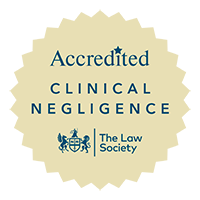Top ranked cerebral palsy claims lawyers
Boyes Turner’s birth injury solicitors secured an £18.1 million settlement for a child who suffered hypoxic ischaemic encephalopathy (HIE), brain bleeding and PVL brain injury after maternity mistakes led to delays in his delivery.
Our client’s birth injury left him with permanent disability from severe whole body cerebral palsy, severe visual impairment, learning difficulties and epilepsy. He cannot walk or talk. He needs full-time, round-the-clock care and will be dependent on others for all of his daily living needs for the rest of his shortened life.
Delays in delivery despite signs of fetal distress
Our client’s mother was booked for delivery of her baby by elective caesarean section after the baby was found to be in the breech position towards the end of her pregnancy. However, when her waters broke spontaneously a few days before the scheduled C-section delivery date, she called the hospital for advice and was told to attend the antenatal ward. On the ward, she was assessed and her liquor was noted to contain fresh meconium. She was having painful contractions but could feel the baby moving. Brief CTG monitoring showed a normal fetal heart rate. She was transferred to the delivery suite.
The CTG was restarted and over the next half hour revealed abnormalities in the fetal heart rate. During this time, the mother told the midwife that her baby’s movements were becoming weaker. A registrar (doctor) attended and performed an ultrasound scan and vaginal examination but then left without reviewing the CTG, or asking the mother about her contractions or reducing fetal movements, or recording her findings in the medical records. No other doctors attended or were called by the midwives to review the mother over the next two and a half hours, during which time the CTG showed increasingly dangerous abnormalities in the fetal heart rate and there was a reduction in fetal movements.
Later, after the baby’s delivery, the registrar retrospectively wrote up her attendance, noting that there had been thick meconium, a breech presentation with the mother’s cervix 2cm dilated and a plan for a category 3 (non-urgent) caesarean section. Correct action by the registrar at her review would have been to arrange a category 2 (urgent) caesarean section, based on the evidence of fetal distress including the CTG abnormalities, meconium, breech presentation and the mother’s pain whilst she was not in established labour. This would have resulted in delivery nearly an hour and a half sooner and would have avoided the permanent damage to the baby’s brain and his severe disability.
Hypoxia during delays leads to HIE brain injury, brain haemorrhages and PVL
Our client was born in very poor condition and needed resuscitation. He was transferred to the neonatal unit, where cord blood tests showed severe, persistent acidosis. He was diagnosed with hypoxic ischaemic encephalopathy (HIE). Over the next few weeks, ultrasound and MRI scans of his brain confirmed the diagnosis of HIE and also showed that he had suffered brain haemorrhages and periventricular leukomalacia (PVL), which our experts believed was caused by the hypoxia that he suffered during the delays leading up to his delivery. He developed hydrocephalus, which was treated with the insertion of a ventricular peritoneal shunt.
Birth injury claim results in admission of liability, interim payments and settlement
We put our client’s claim to NHS Resolution and secured an admission of liability and judgment. We obtained interim payments totalling £2.1 million which enabled us to appoint a Court of Protection deputy and meet our client’s needs for care, therapies and suitable accommodation whilst we worked with the family and our experts to value the claim. We met with NHS Resolution at a round table meeting (RTM) and secured a settlement which provides our client with a lump sum exceeding £7.1 million plus lifelong, guaranteed, index-linked, annual payments for care and case management rising to £366,000 per year.
Our client and his family’s privacy are protected by an anonymity order.
If your child has cerebral palsy or neurological disability as a result of medical negligence, or you have been contacted by HSSIB/MNSI or NHS Resolution, you can talk to a solicitor, free and confidentially, for advice about how to respond or make a claim by contacting us.
They have a great deal of knowledge and expertise, and client care seems to be their top priority.
Chambers Guide to the Legal Profession
Contact our expert Cerebral Palsy solicitors today for support with your claim




